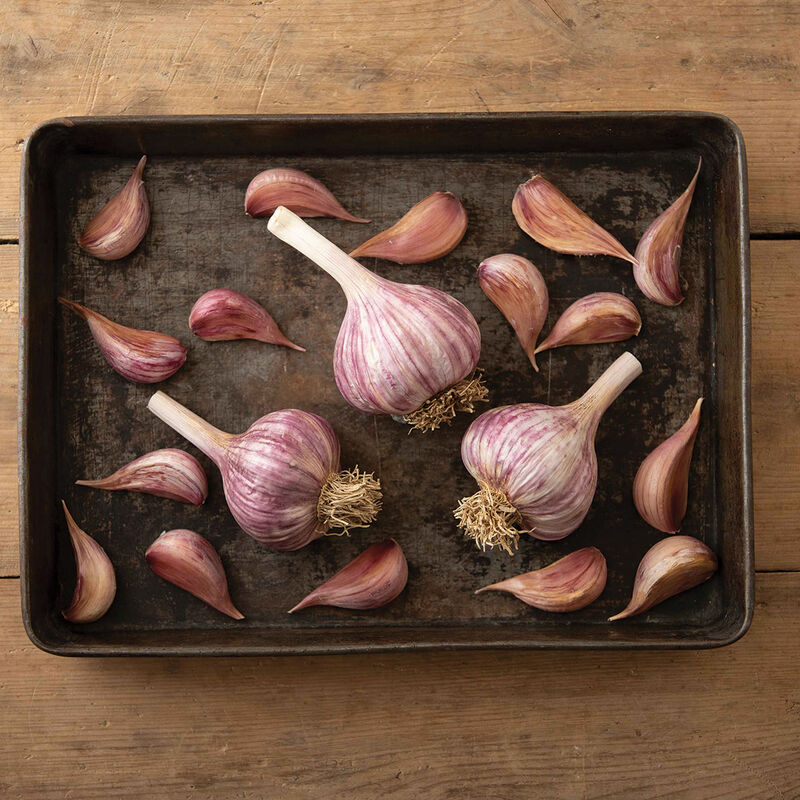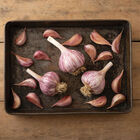Chesnok Red Garlic Bulbs
Chesnok Red Garlic Bulbs
Great for roasting.
Chesnok Red is a cold-hardy purple-striped hardneck variety known for its fine flavor and smooth texture when roasted. Produces large bulbs with 8–12 medium-sized cloves per head. Stores 6 months when cured. A stiffneck or hardneck type. Certified Naturally Grown.
- This product does not ship to Canada.
- This product does not ship to the following countries: United Arab Emirates, Austria, Australia, Barbados, Belgium, Bulgaria, Bermuda, Bahamas, Switzerland, Cyprus, Czech Republic, Germany, Denmark, Estonia, Spain, Finland, France, United Kingdom, Greece, Hong Kong, Croatia, Hungary, Ireland, Iceland, Italy, Japan, Republic of Korea, Kuwait, Cayman Islands, Lithuania, Luxembourg, Latvia, Malta, Netherlands, Norway, New Zealand, Oman, Poland, Portugal, Qatar, Romania, Saudi Arabia, Sweden, Singapore, Slovenia, Slovakia, San Marino, Thailand, Trinidad and Tobago, Taiwan, Ukraine.
- This product does not ship to the following states and jurisdictions: AA, AE, AP, AS, FM, GU, HI, ID, MH, MP, OR, PR, PW, VI.
Garlic bulbs ship in late September to mid October. Orders may ship either FedEx or USPS. Please provide a physical address for delivery.
SCIENTIFIC NAME:
Allium sativumTYPES OF GARLIC:
SOFTNECK (Allium sativum) — the necks are soft at maturity, so this type can be braided. The main type used by the large West Coast growers for marketing and drying. Bulbs produce medium-size cloves on the outside layer, plus 2-4 layers of small, inner cloves. Adapted widely, although somewhat less winter hardy than stiffneck. STIFFNECK (Allium sativum var. ophioscorodon) — the plants send up hard flower stalks called "scapes"; Unlike softneck, the bulbs have large outside cloves, and no inner ones.CULTURE:
Grow in fertile, well-drained soil and full sun. Plant from about the first fall frost date until as late as November. (Spring planting will yield small bulbs.) Plant individual cloves approximately 6" apart in rows 24" apart or 3-4 rows per bed with 6" spacing in and between rows. Push cloves, root end (rounded end) down, about 2-3" into the soil, or place cloves in a furrow and cover with 2-3" of soil. Cover with 3-4" of mulch from grass clippings, straw, or leaves. The largest cloves will produce the largest bulbs; small cloves found at the inside of softneck bulbs can be sown 2" apart for garlic greens. The color, flavor, and size of garlic heads can be variable depending on location, fertility, and weather. Stiffneck garlic requires exposure to cold temperatures. Southern growers who do not experience winter temperatures consistently below 40-50°F (4-10°C) may need to apply a cold treatment: place garlic in a paper bag and refrigerate for 10-12 weeks prior to planting.DISEASE:
To minimize the risk of disease, plant only seed-stock quality garlic, practice a 3-5 year crop rotation out of Alliums, ensure good drainage, and scout for disease regularly. All Johnny's garlic planting stock is tested and certified free from the presence of white rot and parasitic nematodes.TOPPING STIFFNECK GARLIC:
Stiffneck garlic will form flower stalks, called garlic scapes. The scapes are hard, long, curled stalks that appear 1-2 months after the first leaves. Top the plants by cutting the scape from the plant when the scape reaches 1/2 to full curl; topping encourages the plant to focus energy on growing the bulb rather than the scape. Scapes are edible and can be used for pesto or in dishes that call for garlic.HARVEST:
Harvest in summer, when the bottom 3-4 lower leaves turn brown, which should be in June through August, depending on your location. Do not leave in the ground too long or bulbs will separate and rot. Dig garlic with a spading fork or undercutter, being careful not to bruise the bulbs. Brush off the soil before curing and storing the bulbs.CURING & STORAGE:
Cure in a warm, shady place with good air circulation (gentle air flow is important; do not point a fan directly at the curing bulbs). To avoid potential damage to curing bulbs, avoid high heat and direct sun. Hang in bundles or spread as a single layer on screens or drying racks. Allow to cure until the neck is dry and outer skin is papery, approximately 2-3 weeks. Store by braiding or tying several heads together and hanging up, or store by cutting tops off and placing bulbs in a mesh bag or open container. Keep in a cool, dry, well-ventilated place at 45-55°F (7-13°C) and 50-60% relative humidity. Garlic stored in the refrigerator is likely to sprout.SEEDS/LB.:
Stiffneck varieties average 5-8 cloves per head and 40 cloves per pound. Softneck varieties average 7 large cloves per head and 45 cloves per pound. (Please note that these numbers are averages and the actual number of cloves per pound can vary each year depending upon weather and growing conditions during seed production.)Johnny's is committed to your success, every step of the way.
We want you, our customer, to be 100% satisfied with all of our seeds, tools, and supplies.
If anything you purchase from us proves unsatisfactory, we will either replace the item or refund the purchase price.




